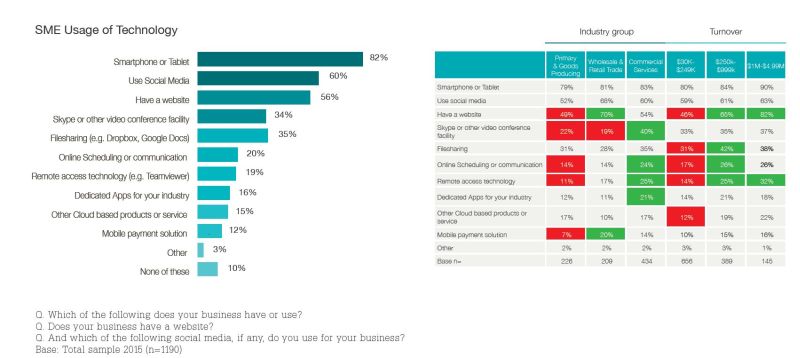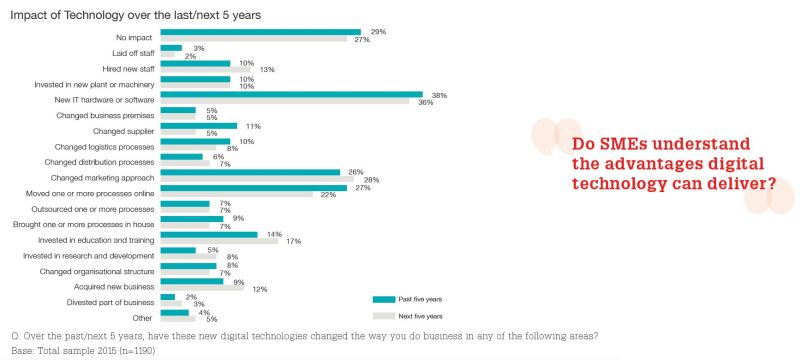Published on the 23/04/2015 | Written by Clare Coulson

The SME sector has surprised many this week by indicating that many business people do not think technology has an important role to play in growing their organisations…
The 2015 Westpac Grow New Zealand report, which was completed online by 1200 SMEs ranging in size from $250,000 to $5 million in turnover, has revealed that almost 30 percent of small to medium enterprises believe that technology has had no impact on their business in the last five years, while 27 percent believe that it will have no impact in the next five. Indeed, only 56 percent said they have a company website while 60 percent said they use social media, despite the fact that 82 percent claimed to have a smartphone or tablet. The figures suggest that there is a distinct lack of understanding of the benefits of digital technology amongst the SME community and it’s tempting to think that the 27 percent of SMEs who do not believe technology is necessary for a successful future will be those that no longer exist in five years’ time.

Despite the negativity surrounding technology, just over 30 percent of the SMEs surveyed said they have experienced positive growth, up 12 percent on 2011, while those who were experiencing tough times have dropped six percent to 20 percent. One of the biggest barriers to growth appears to be the “life-style mentality” of many SME owners with 31 percent claiming that the biggest reason they did not want to grow their business because they wanted to preserve their work/life balance or retire.
Westpac chief executive David McLean said: “The economy is going better than 2011 and prospects are good, but for many SMEs the improved conditions are the cream on the lifestyle cake rather than looking to grow or expand. Trying to encourage our SME owners to invest for growth and to be bold is important to the country given their role in our economy.”
One proven growth driver is the adoption of digital technology but the results of the Westpac survey indicate that even those who are using smartphones, tablets and social media are only doing so in a rudimentary manner. Westpac’s analysts say that few SMEs appear to have restructured their business to suit the new world, and are also not confident about securing the right staff to capitalise on it.
Last year a report by the Productivity Commission said: “To reap the benefits of ICT, firms need to adapt their business practices and train their workers to get the best out of new technology.” But Westpac chief economist Dominick Stephens observed that while productivity gains have been made in the United States by altering business structures to suit the new technological reality, “there doesn’t seem to be as much pressure for New Zealand firms to adapt quite as quickly”.
It is also interesting to note that cloud-based products and services, and mobile payment solutions, which are so often touted as the technology saviours for small to medium enterprises, are only being used by 15 percent and 12 percent of the respondents respectively.
A full 10 percent of survey respondents said their business had neither a smartphone, tablet, website, social media presence or any of the other communication and collaboration technologies that were listed. The adoption of technology is particularly poor in the primary and goods producing industries and in companies with a turnover of $30,000 – $249,000 per year.
Other findings on the impact of technology over the last/next 5 years showed that only:
- 10 percent of firms have hired new staff
- 14 percent have invested in education and training
- 11 percent have changed supplier
- 8 percent have changed organisational structure
- 6 percent have changed a distribution process
- 3 percent have laid off staff because of new digital technology





























I am stunned but not surprised. I think a number of our IT companies have failed to invent a business model that creates a replacement revenue stream for the older methods of onsite servers etc.
Some are doing it but the problem that exists is that Cloud solutions are predominantly monthly based and lower amounts and therefore have very little incentive for IT companies or resellers to push.
More money can be made of traditional IT models.
Coming up with solutions that show value but also have revenue for resellers is a key driver to changing some of this.
The other area is integration of the cloud and mobile solutions. This is not done well at the moment as IT firms traditionally have Network people and integration requires developers.